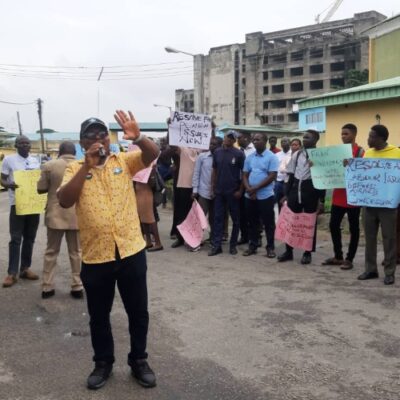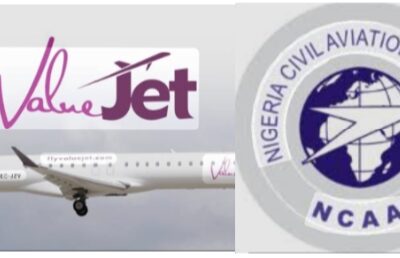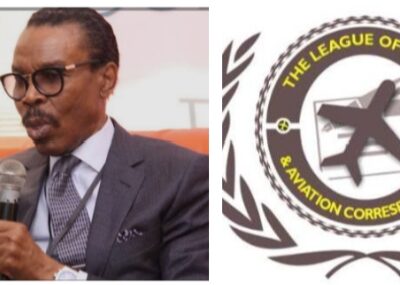
BY OLAPEJU OLUBI
The long-awaited Fly Nigeria Act, hitherto submerged in national politics, has resurfaced with the Minister of Aviation and Aerospace Development, Festus Keyamo, pledging that the document would become law on his watch.
He gave the assurance at a one-day stakeholders’ engagement on the “Legal Framework for the Fly Nigeria Bill and Related Enabling Legislation”, in Abuja, Mr. Keyamo said he will unite key stakeholders to champion the bill’s passage into law because that would be a critical step towards empowering local airlines and the aviation sector in general.
The bill, stalled for over 15 years, aims to mandate all government-funded air travel, whether for personnel, contractors, or goods, be exclusively handled by Nigerian flag carriers.
Former Minister of Aviation, Babatunde Omotoba, revealed that the bill was first drafted over 15 years ago during his tenure and praised Mr. Keyamo for his renewed determination and passion to bring it to fruition.
Keyamo expressed regret over the prolonged delay, noting that it represents missed opportunities for the nation’s aviation industry.
He said, “This has been on the cards for some time, for many years, more than 15 years, because I think my predecessor, Chief Omotoba, served more than 15 years ago. So you can imagine that this bill was taken to council more than 15 years ago, and yet it did not see the light of day. Under my tenure, it will happen.”
“We just want to get things done. And so when I came to office, I saw a couple of these things hanging on my desk, like the Cape Town Convention, to the cry of the Aviation Working Group, and all the proposals that have been made to former governments to develop especially indigenous industry, a local industry. And what we did was to say, ‘Look, let us revive all of these dead things on my table that would help, or that will help, to develop our local industry.'”
“And one of them, of course, is the Fly Nigeria Act. Luckily, Olisa Agbakoba was also talking to me about it. He had brought a proposal.”
“This had been on the cards, like the Cabotage Act too. It’s like also the Cabotage Act you see in the blue economy sector too. So I wonder, I was telling myself, if the Cabotage Act had been passed to favor ships that fly the Nigerian flag, and this had been passed long ago, what is the problem with aviation? It tells you that there’s a certain external cabal in the aviation industry that seeks to destroy your own indigenous markets so that they can come and feed on that market.”
“It’s a global conspiracy, but you have to be smart to see it. Look at the entire African continent. Just look at it. All the foreign airlines in the world feed on the African markets without the competition of African airlines, without fair competition from African airlines.
And they will ensure that these aviation markets in Africa remain taunted. Especially in a big country like Nigeria, they will ensure that it remains taunted so that they will continue to feed on your markets.”
“Air France is coming here full, going back full. Both sides are Nigerians inside. You expect that when they are leaving their country, okay, many of them would have foreigners coming in and Nigerians going out.
“But both sides are Nigerians coming in and going out. Delta, United from America, Lufthansa, British Airways, name all of them—all of them, all the foreign airlines. We thank them for their partnership and all that, but I’m not condemning them.
“I’m saying that we must also develop our own to compete fairly. We just want to compete fairly—Qatar, Emirates, all of them.”
“So, the global conspiracy, it is an aviation, you know, politics all over the world—global policy, aero politics. They do it in such a way, very cleverly, that they don’t want your local market, your local indigenous airlines to, you know, to grow so that they keep feeding on that market.
“So, it is for us to be wise enough to see this and to come up with policies that will then empower our own local operators to match them on the negotiation table.”
“And this is one of the latest in this series of actions we lined up. More are coming, though, to empower them and to make sure they survive. “How do we then create the market for them?”
“We are saying the summary of the Fly Nigeria Act is that every government-funded trip—every government, whether ministry or agency at all—if there is a Nigerian flag carrier flying that route, even locally, regionally, internationally, continentally, you must patronise the Nigerian flag carrier first before any foreign carrier.
“That’s a summary, but you know the details, the devil is in the details. You will see the details, I will say that.
“Even in connecting flights, if the first leg—if you are going to the U.S. and you want to pass through London—and the first leg, a Nigerian flag carrier is traveling the first leg of that trip, but not flying the second leg, you must also fly the first leg with a Nigerian flag carrier and connect to an international air carrier.
“So, what you are doing with the bill is that even if the routes don’t exist, we are creating the market by the bill.”
“We are creating the market because once you see that Nigerians are flying a particular route everyday for one thing or the other, either for training (you know these agencies go for a lot of training and all of that or even Umrah or Hajj. Our dear Muslim brothers, you see what is happening with Hajj), use our local airlines.
“Half of the airlines that operate Hajj are foreign airlines. So, with this bill, all our Hajj pilgrims, every pilgrim must first satisfy the slots given to the Nigerian carriers first. First, before we divide with another person.
“It’s a way to grow the market. And like I said with the routes that are not currently flown by Nigerian carriers, once this bill is passed, they will apply to fly that route, knowing that the market has been created for that route. And for people who don’t want to even lease aircraft to us, they will come and say, ‘Nigerian AOC holders, can you take my aircraft? I know that you have routes to fly now.'”
“They will come and beg us with the aircraft. It’s a way to develop the market and develop routes for our people. That’s the summary of this.
“So we’ll set up a technical session. We have a pre-draft resolution here. The National Assembly members are waiting for the bill to get there.”
“The senators are just waiting. It’s for us to set up a technical committee. We agreed in principle that this is good for us, good for aviation, you know, local operators especially.
“We can look at it. Then I take it to the FEC. I will take the draft to the FEC.”
“Once the president endorses it, we’ll convince them in the FEC. It becomes an executive bill. I think it should go in as an executive bill.
“It becomes easy. I want to go there, get to the National Assembly, and go to a public hearing. I don’t think public hearing will be too much.”
“All of us will just go down and support it at the public hearing. And then first, second, third reading, it becomes law. And we’re in business.”
“We’re in business already, you know. And that will just be my happiness.
“This bill has been pending since the days of my predecessor, Chief Omotoba, over 15 years ago. It has not seen the light of day, but under my tenure, it will happen,” he declared.
Keyamo outlined his commitment to reviving policies and agreements that have long been overlooked, including the Cape Town Convention and other measures aimed at fostering growth in Nigeria’s aviation sector.
“I found a number of important initiatives left dormant. These policies are essential to the development of our local industry, and I’m determined to breathe life into them,” he said.
Drawing comparisons to the Cabotage Act in the maritime industry, which protects ships flying Nigerian flags, Keyamo stressed the need for similar protections in aviation.
“Why has the aviation sector lagged behind? It’s clear there are external forces working to undermine our local industry,” he remarked.
Key stakeholders at the event, including the Vice President of the Airline Operators of Nigeria (AON) and Chairman of Air Peace, Dr. Allen Onyema, and the Chairman of United Nigeria Airline, Professor Obiora Okonkwo, applauded Keyamo’s resolve.
They described the initiative as a significant step forward for the Nigerian aviation industry.
A representative from Olisa Agbakoba Legal, which drafted the proposed bill titled A Proposal on Aviation Reform by Enacting the Fly Nigeria Act, also presented the framework during the session.





